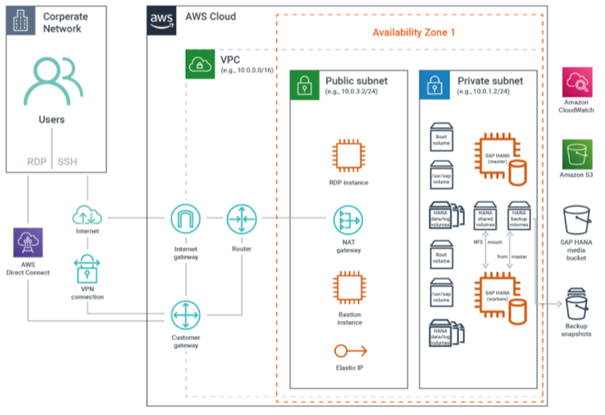SAP on AWS
Over the past few years, thousands of companies have used Amazon Web Service (AWS) to migrate and modernize their SAP landscapes.
Innovation isn't just about doing the same things better - it's about seeing things differently and asking what the future looks like in terms of the business. In addition to the cost and operational benefits, migrating your SAP systems and data to AWS opens up new possibilities. Whether you choose to lift and shift existing investments to reduce costs, modernize business processes with native AWS services, or transform to SAP HANA or the SAP S/4HANA ERP system, AWS can help you create new opportunities with SAP on AWS.
Rethink your SAP system
When it comes to transferring large amounts of data, your own SAP system, is one of the most important application in the enterprise. With the help of AWS and its public cloud offering, you can strengthen your enterprise IT by re-connecting your business and automating applications through the AWS Cloud.
By migrating SAP on AWS, you can not only rethink and redesign business-specific applications, but also take advantage of the AWS Cloud and its associated services Customized for your business. With AWS, you have a lot of options at your disposal. From hosting your complete SAP environment in the AWS cloud, to archiving data volumes and documents of any size, to using test and demo systems in the cloud. In doing so, you can customize resources and services and systems as you see fit and scale as needed. Thanks to the AWS pay-per-use model, you only pay for what you actually use.
Build and use: from testing to hosting your complete SAP environment.
The AWS cloud enables easy migration of SAP systems. SAP customers can use the AWS Cloud for all use cases, from individual SAP test systems to hosting a complete SAP production environment. Also included in the deployment and application areas, SAP test solutions, disaster recovery services, SAP hybrid hosting, legacy systems, archiving of SAP data and the implementation of additional SAP systems.
You determine where your data is stored, who has access to it, and what resources your business consumes at any given time. Secure access to your SAP infrastructure is provided by finely tuned identity and access controls starting from your corporate network via VPN/AWS DirectConnect. These, combined with continuous monitoring, provide near real-time security intelligence and ensure that the right resources have the right access at the right time, wherever your information is stored. In this way, the highly flexible AWS architecture and the use of native cloud services such as S3 -Simple Storage Service, CloudWatch - resource monitoring or RDS -Relational Database Service, can facilitate the operation of SAP itself.

FAQ - Frequently asked questions
What types of services does AWS provide for SAP?
AWS manages the physical infrastructure up to the virtualization layer. The operating system and all SAP applications and databases running over the virtualization layer are managed by the customer. If a management service is needed, AWS has a network of partners that provide SAP consulting and management services in AWS. See Find an SAP Partner to find an AWS SAP partner.
Does AWS offer SAP administration and hosting services?
No. AWS is an SAP-certified Global Technology Partner and focuses on providing a highly available, scalable, cost-effective infrastructure platform in the cloud. AWS itself does not offer SAP-specific services, but has a network of partners that provide SAP consulting and management services in AWS. For more information about the services offered and to find an AWS SAP partner, see the Find an SAP Partner page.